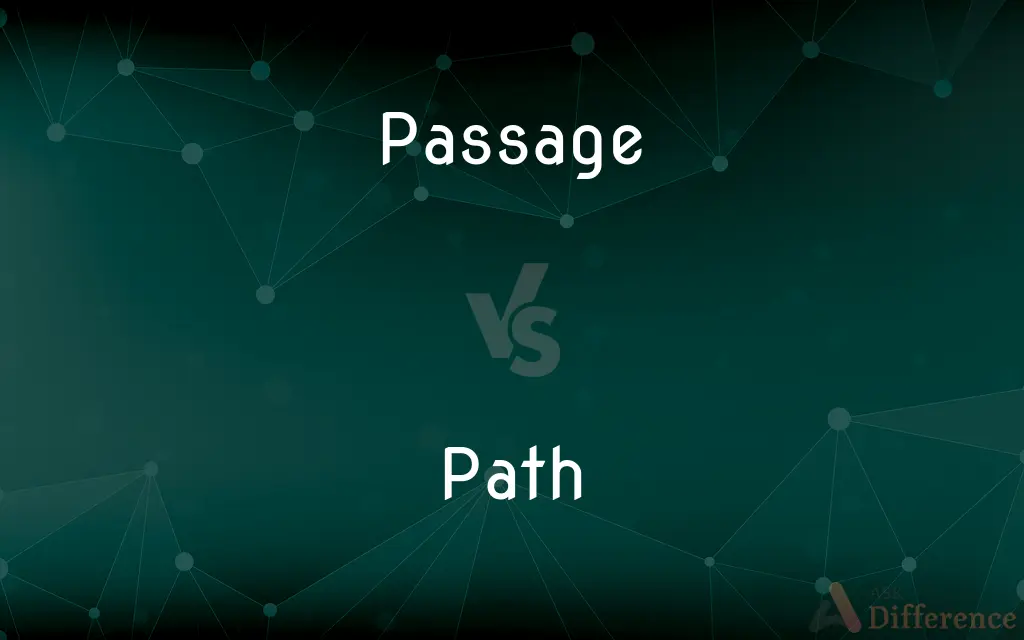Passage vs. Path — What's the Difference?
Edited by Tayyaba Rehman — By Urooj Arif — Updated on April 18, 2024
A passage typically refers to a way through or along something, often enclosed or narrow, while a path is generally a trail or route for walking, often through natural settings.

Difference Between Passage and Path
Table of Contents
ADVERTISEMENT
Key Differences
A passage is often understood as an enclosed or clearly defined space through which one can move, such as a hallway or corridor in a building, while a path is usually an open trail or track that can be found outdoors, like in a park or wilderness.
Passages are commonly associated with indoor environments or constructed spaces, designed to connect different areas within a structure, whereas paths are typically part of natural or landscaped environments, serving to guide walkers or hikers.
In literature, a passage can refer to a section of text, conveying a specific portion of a narrative or argument, whereas a path in literature often symbolizes a journey or a direction in life or a story.
The concept of a passage can also include metaphorical uses, such as the passage of time, suggesting a process or transition, on the other hand, a path can metaphorically represent choices or courses one takes in life.
In terms of usage, "passage" can also imply movement or travel between places, like the passage through a canal, while a path often suggests a more leisurely or explorative journey, with less emphasis on enclosure and more on the journey itself.
ADVERTISEMENT
Comparison Chart
Definition
A route or way through something, often enclosed.
A way or track laid down for walking or made by continual treading.
Typical Location
Indoors (buildings, tunnels), enclosed spaces.
Outdoors (parks, forests), open areas.
Usage in Literature
Often a metaphor for a journey through life or time.
Commonly represents literal or metaphorical journeys.
Connotation
Can imply transition or movement through stages.
Suggests exploration, choice in direction.
Function
Connects different areas within a structure.
Provides a route for travel or leisure.
Compare with Definitions
Passage
A journey by sea or air.
The passage from England to India took five weeks.
Path
A metaphor for a series of actions or decisions.
His career path was unconventional but successful.
Passage
A corridor inside a building.
The passage led us from the kitchen to the bedrooms.
Path
A track formed by continuous treading.
A narrow path led to the local village.
Passage
The process of time going by.
The passage of the seasons is quite evident in this region.
Path
A trail for walking in a park or wilderness.
The path wound its way through the towering trees.
Passage
A part of a written work.
She read a moving passage about love and loss.
Path
A way of life or direction chosen by a person.
She followed a path dedicated to helping others.
Passage
The act of passing through a place.
The passage through the dense forest was challenging.
Path
A course of action or way of achieving a goal.
He chose a path of reconciliation rather than conflict.
Passage
The action or process of moving through or past somewhere on the way from one place to another
There were moorings for boats wanting passage through the lock
Path
A way or track laid down for walking or made by continual treading
The path continues alongside the river for half a mile
Passage
A narrow way allowing access between buildings or to different rooms within a building; a passageway
The larger bedroom was at the end of the passage
Path
(chiefly in computing and railway contexts) allocate a path.
Passage
The process of transition from one state to another
An allegory on the theme of the passage from ignorance to knowledge
Path
A trodden track or way.
Passage
A short extract from a book or other printed material
He picked up the newspaper and read the passage again
Path
A road, way, or track made for a particular purpose
A bicycle path.
Passage
The propagation of microorganisms or cells in a series of host organisms or culture media, so as to maintain them or modify their virulence
Cultured cells can replicate on serial passage for predictable periods of time
Path
The route or course along which something travels or moves
The path of a hurricane.
Passage
A movement performed in advanced dressage and classical riding, in which the horse executes a slow elevated trot, giving the impression of dancing.
Path
A course of action or conduct
The path of righteousness.
Passage
Subject (a strain of microorganisms or cells) to a passage
Each recombinant virus was passaged nine times successively
Path
A sequence of commands or a link between points that is needed to reach a particular goal.
Passage
Movement from one place to another
The passage of water through a sieve.
Path
A pathname.
Passage
The process of elapsing
The passage of time.
Path
A trail for the use of, or worn by, pedestrians.
Passage
Enactment into law of a legislative bill.
Path
A course taken.
The path of a meteor, of a caravan, or of a storm
Passage
A journey, especially one by air or water
We had a rough passage on the stormy sea.
Path
(paganism) A Pagan tradition, for example witchcraft, Wicca, druidism, Heathenry.
Passage
The right to travel as a passenger, especially on a ship
Book passage.
Pay for one's passage.
Path
A metaphorical course or route; progress.
Passage
The right, permission, or power to come and go freely
Only medical supply trucks were granted safe passage through enemy territory.
Path
A method or direction of proceeding.
Passage
A path, channel, or duct through, over, or along which something may pass
The nasal passages.
Path
(computing) A human-readable specification for a location within a hierarchical or tree-like structure, such as a file system or as part of a URL.
Use the network path
\\Marketing\Files to find the documents you need.Passage
A corridor.
Path
(graph theory) A sequence of vertices from one vertex to another using the arcs (edges). A path does not visit the same vertex more than once (unless it is a closed path, where only the first and the last vertex are the same).
Passage
An occurrence or event
"Another encouraging passage took place ... when heads of state ... took note of the extraneous factors affecting their economies that are beyond their control" (Helen Kitchen).
Path
(topology) A continuous map from the unit interval to a topological space .
Passage
Something, such as an exchange of words or blows, that occurs between two persons
A passage at arms.
Path
(rail) A slot available for allocation to a railway train over a given route in between other trains.
Passage
A segment of a written work or speech
A celebrated passage from Shakespeare.
Path
Pathology.
Passage
(Music) A segment of a composition, especially one that demonstrates the virtuousity of the composer or performer
A passage of exquisite beauty, played to perfection.
Path
(transitive) To make a path in, or on (something), or for (someone).
Passage
A section of a painting or other piece of artwork; a detail.
Path
To navigate through a file system directory tree (to a desired file or folder).
Next, you need to path to the location of the executable and run it from there.
Passage
(Physiology) The process of discharging something from a bodily part, such as evacuation of waste from the bowels.
Path
A trodden way; a footway.
The dewy paths of meadows we will tread.
Passage
(Medicine) The introduction of an instrument into a bodily cavity.
Path
A way, course, or track, in which anything moves or has moved; route; passage; an established way; as, the path of a meteor, of a caravan, of a storm, of a pestilence. Also used figuratively, of a course of life or action.
All the paths of the Lord are mercy and truth.
The paths of glory lead but to the grave.
Passage
(Obsolete) Death.
Path
To make a path in, or on (something), or for (some one).
Passage
A slow cadenced trot in which the horse raises and returns to the ground first one diagonal pair of feet, then the other.
Path
To walk or go.
Passage
To execute such a trot in dressage.
Path
A course of conduct;
The path of virtue
We went our separate ways
Our paths in life led us apart
Genius usually follows a revolutionary path
Passage
To cause (a horse) to execute such a trot in dressage.
Path
A way especially designed for a particular use
Passage
A paragraph or section of text or music with particular meaning.
Passage of scripture
She struggled to play the difficult passages.
Path
An established line of travel or access
Passage
Part of a path or journey.
He made his passage through the trees carefully, mindful of the stickers.
Path
A line or route along which something travels or moves;
The hurricane demolished houses in its path
The track of an animal
The course of the river
Passage
An incident or episode.
Passage
The official approval of a bill or act by a parliament.
The company was one of the prime movers in lobbying for the passage of the act.
Passage
The advance of time.
Passage
(art) The use of tight brushwork to link objects in separate spatial plains. Commonly seen in Cubist works.
Passage
A passageway or corridor.
Passage
(nautical) A strait or other narrow waterway.
The Northwest Passage
Passage
(caving) An underground cavity, formed by water or falling rocks, which is much longer than it is wide.
Passage
(euphemistic) The vagina.
Passage
The act of passing; movement across or through.
Passage
The right to pass from one place to another.
Passage
A fee paid for passing or for being conveyed between places.
Passage
Serial passage.
Passage
A gambling game for two players using three dice, in which the object is to throw a double over ten.
Passage
(dressage) A movement in classical dressage, in which the horse performs a very collected, energetic, and elevated trot that has a longer period of suspension between each foot fall than a working trot.
Passage
(medicine) To pass something, such as a pathogen or stem cell, through a host or medium.
He passaged the virus through a series of goats.
After 24 hours, the culture was passaged to an agar plate.
Passage
(rare) To make a passage, especially by sea; to cross.
They passaged to America in 1902.
Passage
To execute a passage movement.
Passage
The act of passing; transit from one place to another; movement from point to point; a going by, over, across, or through; as, the passage of a man or a carriage; the passage of a ship or a bird; the passage of light; the passage of fluids through the pores or channels of the body.
What! are my doors opposed against my passage!
Passage
Transit by means of conveyance; journey, as by water, carriage, car, or the like; travel; right, liberty, or means, of passing; conveyance.
The ship in which he had taken passage.
Passage
Price paid for the liberty to pass; fare; as, to pay one's passage.
Passage
Removal from life; decease; departure; death.
When he is fit and season'd for his passage.
Passage
Way; road; path; channel or course through or by which one passes; way of exit or entrance; way of access or transit. Hence, a common avenue to various apartments in a building; a hall; a corridor.
And with his pointed dartExplores the nearest passage to his heart.
The Persian army had advanced into the . . . passages of Cilicia.
Passage
A continuous course, process, or progress; a connected or continuous series; as, the passage of time.
The conduct and passage of affairs.
The passage and whole carriage of this action.
Passage
A separate part of a course, process, or series; an occurrence; an incident; an act or deed.
The . . . almost incredible passage of their unbelief.
Passage
A particular portion constituting a part of something continuous; esp., a portion of a book, speech, or musical composition; a paragraph; a clause.
How commentators each dark passage shun.
Passage
Reception; currency.
Passage
A pass or en encounter; as, a passage at arms.
No passages of loveBetwixt us twain henceforward evermore.
Passage
A movement or an evacuation of the bowels.
Passage
In parliamentary proceedings: (a) The course of a proposition (bill, resolution, etc.) through the several stages of consideration and action; as, during its passage through Congress the bill was amended in both Houses. (b) The advancement of a bill or other proposition from one stage to another by an affirmative vote; esp., the final affirmative action of the body upon a proposition; hence, adoption; enactment; as, the passage of the bill to its third reading was delayed.
The final question was then put upon its passage.
Passage
The act of passing from one state or place to the next
Passage
A section of text; particularly a section of medium length
Passage
A way through or along which someone or something may pass
Passage
The passing of a law by a legislative body
Passage
A journey usually by ship;
The outward passage took 10 days
Passage
A short section of a musical composition
Passage
A path or channel or duct through or along which something may pass;
The nasal passages
Passage
A bodily process of passing from one place or stage to another;
The passage of air from the lungs
The passing of flatus
Passage
The motion of one object relative to another;
Stellar passings can perturb the orbits of comets
Passage
The act of passing something to another person
Common Curiosities
Are paths always made of dirt or gravel?
Paths can be made of various materials including dirt, gravel, concrete, or even wood chips, depending on their location and intended use.
What materials are typically associated with constructing a passage?
Passages are typically constructed using building materials like brick, wood, or concrete.
How do paths impact the environment?
Paths can have both positive and negative impacts on the environment; they provide access to natural areas but can also contribute to habitat fragmentation and erosion.
Are there safety considerations for both paths and passages?
Yes, both require maintenance to ensure safety; passages may need lighting and clear signage, while paths may require clearing of obstacles and stable surfaces.
Can the term "passage" refer to anything in music?
In music, a passage can refer to a particular section or a series of notes that are distinct within a piece.
Can both terms be used in a nautical context?
Yes, in nautical contexts, "passage" refers to a journey by water, whereas "path" could describe the planned route of the vessel.
What is the difference between a footpath and a path?
A footpath is specifically designed for walking, whereas a path can be used for walking or may also accommodate bicycles and other small vehicles.
What maintenance is required for paths exposed to harsh weather?
Paths exposed to harsh weather require regular maintenance such as clearing snow or debris, repairing erosion damage, and reinforcing the pathway material.
Is there a legal implication to the term "right of passage"?
"Right of passage" typically refers to the legal right to travel across property owned by another, which is more accurately termed "right of way."
How are passages and paths represented in symbolic or allegorical literature?
In allegorical literature, passages often symbolize personal or spiritual transitions, whereas paths might symbolize choices and journeys in life.
What does the term "passage of arms" mean?
Historically, a "passage of arms" was a formal challenge or duel among knights or warriors.
What considerations are taken when designing a passage in a building?
Design considerations include width, height, lighting, accessibility, and connection points between areas.
Can "passage" and "path" have similar meanings in any context?
In some contexts, such as in discussing routes or journeys, "passage" and "path" can have overlapping meanings, though "passage" often implies a more enclosed or structured route.
How do the functions of passages and paths differ in urban planning?
In urban planning, passages are used to facilitate movement within buildings and between urban spaces, while paths are integrated into landscapes for recreational and transit purposes.
What role do paths play in park design?
Paths are crucial in park design for directing visitor flow, providing access to different areas, and enhancing the aesthetic and functional aspects of the park.
Share Your Discovery

Previous Comparison
Resilience vs. Strength
Next Comparison
Woe vs. WooAuthor Spotlight
Written by
Urooj ArifUrooj is a skilled content writer at Ask Difference, known for her exceptional ability to simplify complex topics into engaging and informative content. With a passion for research and a flair for clear, concise writing, she consistently delivers articles that resonate with our diverse audience.
Edited by
Tayyaba RehmanTayyaba Rehman is a distinguished writer, currently serving as a primary contributor to askdifference.com. As a researcher in semantics and etymology, Tayyaba's passion for the complexity of languages and their distinctions has found a perfect home on the platform. Tayyaba delves into the intricacies of language, distinguishing between commonly confused words and phrases, thereby providing clarity for readers worldwide.
















































